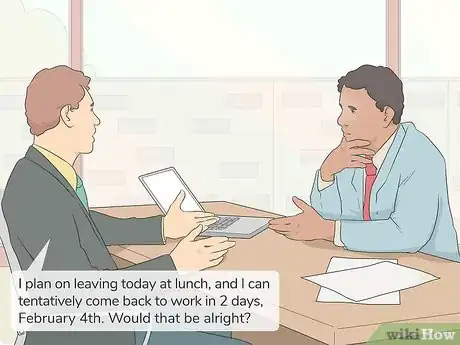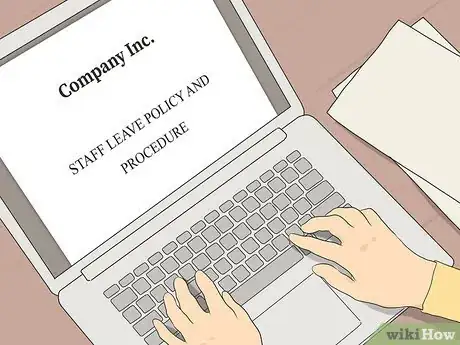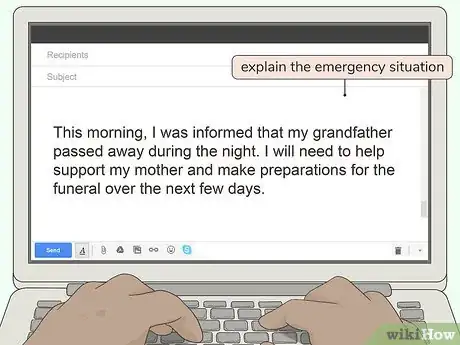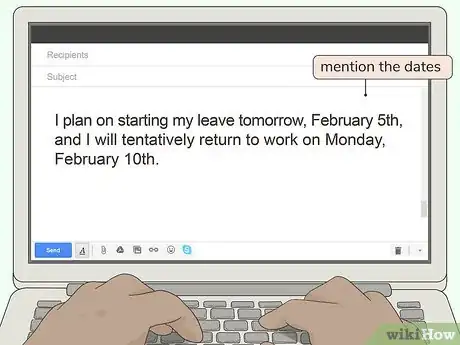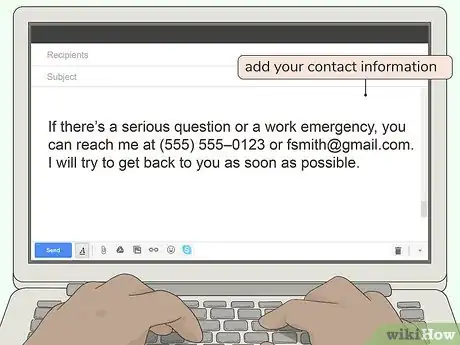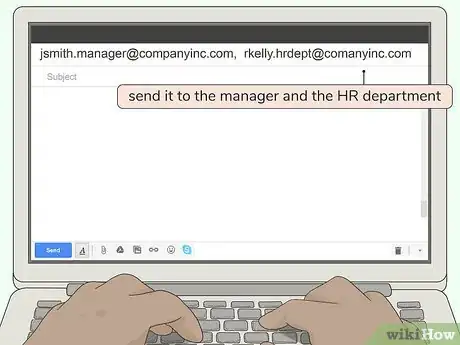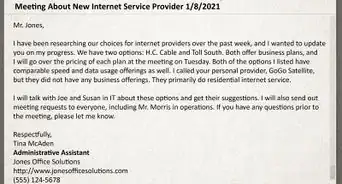This article was co-authored by Brandy DeOrnellas, PCC, ESQ. and by wikiHow staff writer, Hunter Rising. Brandy DeOrnellas is a Professional Certified Coach specializing in life and career aspirations and transitions. She also serves company founders and small business owners. She is a former attorney with more than three years of experience as a coach. Brandy holds a JD from Harvard Law School. She also holds a BA in Social Welfare and a BA in Political Science from The University of California, Berkeley. In addition to her formal education, she has multiple coaching certifications, including a Professional Coaching Certification from The University of California, Davis, and a Relationship Coach Certification from Prepare/Enrich. She is a Professional Certified Coach (PCC) with the International Coaching Federation.
There are 8 references cited in this article, which can be found at the bottom of the page.
This article has been viewed 50,160 times.
Whether there’s a burst pipe in your home or a medical emergency, you may need to take time off of work while you address the situation. While talking to your manager can add more stress, many times they’ll be understanding and allow you time off. If you have the chance, try reaching out to them in person or over the phone so you can speak to them directly. If you don’t have time to see or call them, write an email to them as soon as possible to let them know.
Steps
Addressing Your Manager in Person
-
1Check your company’s leave policy to see what’s covered. Look in the absence and leave portion of the company or employee manual to see what constitutes an emergency. Many times, you’re able to take off if you have a medical emergency or death in the family, an accident in the home, or a sick child you need to take care of. Check if there are a specified number of days you’re allowed to take for each type of emergency.[1]
- If the emergency requires urgent care, you can skip this and talk to your manager about the situation immediately.
- Leave may be paid or unpaid depending on the situation you’re experiencing and how much leave you’ve used throughout the rest of the year.
- If your company doesn’t have a leave policy or human resources (HR) department, then talk directly to your manager.
-
2Describe the emergency that needs your attention to your manager. Pull your manager aside or call them as soon as you’re able and explain what happened. Maintain a polite tone while you’re talking to them so they’re more likely to empathize with you.[2] Give them as many details as you’re comfortable explaining so they understand the urgency of the situation.[3]
- For example, you may say, “This morning, my father had a heart attack and is in critical condition, so I need to be there to monitor him and help support my mother.”
- As another example, you could say, “My daughter’s school called and said that she needs to come home from school. My wife is traveling, and I have to step out and take care of her.”
- You don’t need to tell your manager a full medical diagnosis if there’s an accident or medical emergency.
Advertisement -
3Tell your manager when you expect to return to work. Try to give your best estimate to when you’ll be back. Use the word “tentatively” or the phrase “plan to” in case there are complications.[4] If it’s a minor emergency, such as picking up someone after an accident or dropping off a child at daycare, try getting back within the day. For a more serious condition, such as a medical emergency, let them know how many days you’ll need off.[5]
- For example, you may say, “I plan on leaving today at lunch, and I can tentatively come back to work in 2 days, February 4th. Would that be alright?”
- If you don’t know how long you’ll be out from work, give your manager a time where you’ll contact them again so you can further explain the situation.
-
4Help delegate your work responsibilities to other employees. Ask other employees you work with to see if they can cover your shift or duties while you’re away. Try offering to take a future shift from them in exchange for them working during yours. Make sure the employee knows what you usually complete so they don’t forget anything while you’re away.[6]
- Your boss may also assign other employees to your duties.
- For example, you could say, “I can talk to Denise and Otto to help cover my paperwork and calls while I’m gone.”
- If you know that you’ll need to leave unexpectedly in the future, like if your partner is pregnant and they go into labor, plan with other employees a few weeks ahead of time so they can continue working on your duties while you’re away.
Tip: If you’re able to, offer to work remotely so you can still complete some of your duties while you’re away.
-
5Send a follow-up email restating the details of your leave. Put “Emergency Leave” or something similar in the subject line. Mention the reason you’re leaving, how long you expect to be gone, and any other information you discussed with your manager in the body.[7] Thank them at the end of the email and ask them to reach out if they need any other information.[8]
- Sending an email also protects you in case your manager says you left without any warning.
- Your manager may ask you to send the email to your company’s HR department as well.
-
6Get verification of the emergency if your manager requests one. Your manager may ask for verification if the emergency pulls you out of work to ensure you aren’t taking advantage of them. Ask anyone involved in the emergency for a copy of an official document, such as an accident report, doctor’s note, or a death certificate. Give the copy to your manager or email it to them as soon as possible.[9]
- The need for verification depends on your workplace. Check the employee manual to find the full details of what’s required.
Writing an Emergency Leave Email
-
1Check your company leave policy to see if they have any special forms. Read through the employee manual or contact your company’s HR department to find out what’s covered by emergency leave. Check if there are any online forms or paperwork you need to file before you take the leave. Follow your company’s policy in full, or else you could get in trouble at work.[10]
- Leave policies vary by company, so always look them up before sending an email to your manager.
- If your company doesn’t have an HR department or leave policy, talk directly to your manager to find out.
-
2Explain the emergency situation and why you need to be there. Start your email with a brief paragraph discussing what has happened and who was involved. Give as many details as you’re comfortable with to help your manager understand the severity of the situation. Briefly talk about what you’re going to do during your leave so your manager sees you aren’t taking advantage of them.[11]
- For example, you could write, “This morning, I was informed that my grandfather passed away during the night. I will need to help support my mother and make preparations for the funeral over the next few days.”
Expert AnswerQHow do I ask for a sudden leave without explaining it?
Brandy DeOrnellas is a Professional Certified Coach specializing in life and career aspirations and transitions. She also serves company founders and small business owners. She is a former attorney with more than three years of experience as a coach. Brandy holds a JD from Harvard Law School. She also holds a BA in Social Welfare and a BA in Political Science from The University of California, Berkeley. In addition to her formal education, she has multiple coaching certifications, including a Professional Coaching Certification from The University of California, Davis, and a Relationship Coach Certification from Prepare/Enrich. She is a Professional Certified Coach (PCC) with the International Coaching Federation.Career & Life Transition Coach
 EXPERT ADVICEAnswer from Brandy DeOrnellas, PCC, ESQ.:
EXPERT ADVICEAnswer from Brandy DeOrnellas, PCC, ESQ.:Be straightforward and just share the details that you're comfortable sharing. Your employer or team may ask for more specifics, but you can simply repeat what you’ve already shared. If they keep prodding, you can reply with: “I’ve shared all I’m comfortable sharing.”
-
3Include the start and estimated end date for your leave. Write the start and end date at the end of the first paragraph or the beginning of the second one. Mention the date or time you plan on leaving to address the emergency. When you bring up the end date, use the phrase “tentatively” or “hopefully” so you have some flexibility on when you need to return.[12]
- For example, you can write, “I plan on starting my leave tomorrow, February 5th, and I will tentatively return to work on Monday, February 10th.”
-
4Add your contact information for others to reach you while you’re away. Write down your phone number or an email address where your manager or coworkers can reach you if there’s an emergency. Let them know that you won’t be monitoring regular calls and emails, and only responding if they’re urgent.[13]
- For example, you could include, “If there’s a serious question or a work emergency, you can reach me at (555) 555–0123 or example@gmail.com. I will try to get back to you as soon as possible.”
-
5Submit the email to your manager and the HR department. Attach the files for any additional forms you filled out for the company. Send your manager and the HR department the email so they can review the leave request. Typically, they will respond as soon as possible so you know if your leave has been approved.[14]
- Depending on the company and emergency situation, you may receive paid or unpaid leave.
- Your manager may submit the email to the HR department so you don’t have to.
Tip: Proofread your email before you send it to ensure everything looks correct and maintain a professional tone.
-
6Stay in contact with your manager to update them on the situation. Call your manager with any updates on the situation so they know when you’re coming back. Tell them if you expect to be back sooner or later than your estimated date so they can plan accordingly. If you’re unable to call them, send them an email instead so they stay updated.[15]
-
7Provide emergency verification if your manager requires it. Ask for a copy of a doctor’s note, accident or police report, or a death certificate depending on the emergency situation you’re handling. Attach the copy to an email and forward it to your manager and the HR department so they both have the information.[16]
- Companies usually require verification if you’re pulled out of work for more than a few days at a time.
- Your company may have an approved list of verification, so check the employee manual to see what’s required.
Expert Q&A
-
QuestionHow do you inform an emergency leave?
 Brandy DeOrnellas, PCC, ESQ.Brandy DeOrnellas is a Professional Certified Coach specializing in life and career aspirations and transitions. She also serves company founders and small business owners. She is a former attorney with more than three years of experience as a coach. Brandy holds a JD from Harvard Law School. She also holds a BA in Social Welfare and a BA in Political Science from The University of California, Berkeley. In addition to her formal education, she has multiple coaching certifications, including a Professional Coaching Certification from The University of California, Davis, and a Relationship Coach Certification from Prepare/Enrich. She is a Professional Certified Coach (PCC) with the International Coaching Federation.
Brandy DeOrnellas, PCC, ESQ.Brandy DeOrnellas is a Professional Certified Coach specializing in life and career aspirations and transitions. She also serves company founders and small business owners. She is a former attorney with more than three years of experience as a coach. Brandy holds a JD from Harvard Law School. She also holds a BA in Social Welfare and a BA in Political Science from The University of California, Berkeley. In addition to her formal education, she has multiple coaching certifications, including a Professional Coaching Certification from The University of California, Davis, and a Relationship Coach Certification from Prepare/Enrich. She is a Professional Certified Coach (PCC) with the International Coaching Federation.
Career & Life Transition Coach That depends if you want to frame your conversation as a statement or a request. If your leave is necessary, don't suggest to your employer that it is open for negotiation. Don't make a request, make a statement.
That depends if you want to frame your conversation as a statement or a request. If your leave is necessary, don't suggest to your employer that it is open for negotiation. Don't make a request, make a statement. -
QuestionIs it good to offer help during the leave?
 Brandy DeOrnellas, PCC, ESQ.Brandy DeOrnellas is a Professional Certified Coach specializing in life and career aspirations and transitions. She also serves company founders and small business owners. She is a former attorney with more than three years of experience as a coach. Brandy holds a JD from Harvard Law School. She also holds a BA in Social Welfare and a BA in Political Science from The University of California, Berkeley. In addition to her formal education, she has multiple coaching certifications, including a Professional Coaching Certification from The University of California, Davis, and a Relationship Coach Certification from Prepare/Enrich. She is a Professional Certified Coach (PCC) with the International Coaching Federation.
Brandy DeOrnellas, PCC, ESQ.Brandy DeOrnellas is a Professional Certified Coach specializing in life and career aspirations and transitions. She also serves company founders and small business owners. She is a former attorney with more than three years of experience as a coach. Brandy holds a JD from Harvard Law School. She also holds a BA in Social Welfare and a BA in Political Science from The University of California, Berkeley. In addition to her formal education, she has multiple coaching certifications, including a Professional Coaching Certification from The University of California, Davis, and a Relationship Coach Certification from Prepare/Enrich. She is a Professional Certified Coach (PCC) with the International Coaching Federation.
Career & Life Transition Coach Are you able to offer help during your leave? If your situation allows you to be available for questions if something urgent arises, offer your support to the team during the leave. If you do not plan to be available during this time, make that clear.
Are you able to offer help during your leave? If your situation allows you to be available for questions if something urgent arises, offer your support to the team during the leave. If you do not plan to be available during this time, make that clear.
Warnings
- Don’t try to take advantage of using emergency leaves.⧼thumbs_response⧽
- Your place of employment may only cover emergency leave for certain situations or they may have set amounts of time depending on the emergency. Check the employee or company manual to see what they cover.[17]⧼thumbs_response⧽
References
- ↑ http://www.ilo.org/dyn/travail/docs/2577/q-a-emergency-leave-and-other-short-absence-leave.pdf
- ↑ https://www.careeraddict.com/leave-of-absence
- ↑ Brandy DeOrnellas, PCC, ESQ.. Career & Life Transition Coach. Expert Interview. 15 December 2021.
- ↑ Brandy DeOrnellas, PCC, ESQ.. Career & Life Transition Coach. Expert Interview. 15 December 2021.
- ↑ https://money.usnews.com/money/careers/company-culture/articles/how-to-ask-for-a-leave-of-absence
- ↑ https://fairygodboss.com/career-topics/medical-leave
- ↑ https://money.usnews.com/money/careers/company-culture/articles/how-to-ask-for-a-leave-of-absence
- ↑ Brandy DeOrnellas, PCC, ESQ.. Career & Life Transition Coach. Expert Interview. 15 December 2021.
- ↑ https://stepstojustice.ca/steps/employment-and-work/5-get-proof-about-needing-personal-emergency-leave
- ↑ http://www.ilo.org/dyn/travail/docs/2577/q-a-emergency-leave-and-other-short-absence-leave.pdf
- ↑ https://www.careeraddict.com/leave-of-absence
- ↑ https://www.careeraddict.com/leave-of-absence
- ↑ https://www.careeraddict.com/leave-of-absence
- ↑ https://www.careeraddict.com/leave-of-absence
- ↑ https://money.usnews.com/money/careers/company-culture/articles/how-to-ask-for-a-leave-of-absence
- ↑ https://stepstojustice.ca/steps/employment-and-work/5-get-proof-about-needing-personal-emergency-leave
- ↑ https://money.usnews.com/money/careers/company-culture/articles/how-to-ask-for-a-leave-of-absence


